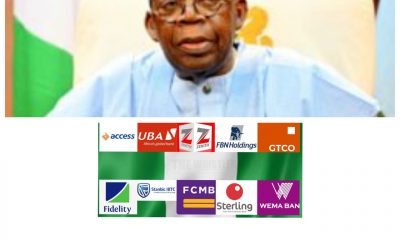Economy
Udemezue Gives CBN Tricks to Tackle Nigeria’s High Inflation

By Ahmed Rahma
The Chief Executive Officer (CEO) of Flame Academy & Consulting Limited, Mr Orji Chigozie Udemezue, has advised the Central Bank of Nigeria (CBN) to apply contractionary measures to curb inflation in the country.
According to the National Bureau of Statistics (NBS), inflation in Nigeria rose in December 2020 by 15.75 per cent and for Mr Udemezue, this is very high.
To control this, the economist has told the central bank to reduce government spending by stabilising price, which according to him, is the main duty of central banks across the globe.
Mr Udemezue, while speaking on Channels Business Morning, added that when CBN raises rate, there will be so much rush for money market instruments as banks would not be able to carry out their primary function of lending money to customers because people will not be able to borrow at a higher rate, allowing the apex bank to mop up the excess liquidity in circulation, which will slow down inflation pressure.
“Prices are still going up. Theoretically, we see that inflation today is about 15.75 per cent but actually in the market, most prices have gone more than 50 per cent on the things we buy.
“[The] duty of the central bank is to maintain price stability, that’s everywhere in the world and to do that, looking at the way things are now, we expect that the central bank should be trying to curb inflation by doing what they call monetary policy contraction, trying to apply contractionary measures i.e trying to raise rate. When they raise the rate for example, what will happen is that there is so much rush for money market instruments, banks will not be able to lend out more money and people will not be able to borrow at a higher rate and, therefore, you mopped up the money in circulation and then slow down inflation pressure,” he said.
Commenting on the fact that MPC was confronted with a policy dilemma at the last meeting, he said, “well, it is just the option of sit down dey look, let’s just watch as things go, because the whole essence of monetary policy obviously is to manage the quantity of money in supply in the economy.
“The argument theoretically is that when there is so much money in circulation, there is a lot of money pursuing a few goods, therefore, driving prices up.
“So, the primary duty of central banks all over the world is to maintain monetary stability, ensuring that price increase in the economy does not go at hyper rate i.e. saying inflation like in Nigeria having double-digit and beyond, that’s what damages productivity.
“So, you find that the Central Bank of Nigeria is in a very big dilemma. Ordinarily, if you look at their objective of maintaining price stability, we are losing it.”
Expressing his belief on the measures, he said, “You know, that’s what we should be looking at right now. If they do that, trust me, it is going to be very counterproductive because already, the economy is in deep trouble with COVID-19 and all of that.
“So, at this point, no reasonable central bank will be looking at an increase in rate instead everywhere in the world, we are looking at monetary easing or what they call expansionary monetary policy, whereby rates are brought down to enable the real sense of economy to enable to borrow at a reasonable rate, drive production and be able to reverse as it is now and economy in recession.”
According to him while answering the question of what is driving inflation in Nigeria, the pressure on foreign exchange (FX) is the major cause and the fact that the country depends too much on foreign goods.
“[The] Nigerian economy is a very peculiar economy, many times it tends to work out most established economic theories and even practices.
“Elsewhere in the world, there are no major issues about inflation because domestic demand is at its lowest level, travels are restricted, the COVID-19 lockdown has left people with no jobs.
“Theoretically, people don’t have money to spend.
“Most economy especially western economies, you find that aggregate demand is actually on a decline and, therefore, purchases are not going up as it should be. So, inflation is actually low in those places unlike in Nigeria, the argument is different.
“The factors driving inflation in Nigeria is not demand-pull, it is not about you and I having so much money in our pocket, having greater command for commodities.
“So, what happens here is inflation flows really from FX pressure. We are not self-sustaining and we import practically everything we use. So, the pressure on our FX, input costs is huge.
“Our local manufacturers have to import there input materials which are now at the all-time rate and then the finished goods we also import that we use in domestic things like the furniture and office equipment are also coming at a much higher rate because of the devaluation and depreciation of our currency.
“What is causing this depreciation? Until we address the issue of continuous depreciation of our currency, inflation can never be dealt with.
‘That is why even at the time when all of us are not demanding much when domestic demand is so low, we still see inflation climbing up the roof particularly food inflation and similar factors.
Economy
Moniepoint Research Shows Diminishing Role of Cash in Nightlife Payments

By Modupe Gbadeyanka
A new report released by Africa’s leading all-in-one financial ecosystem, Moniepoint Incorporated, has revealed that the use of cash for financial transactions is gradually dying due to security concerns.
The study, which looked into transaction data of over 27,000 clubs, bars, and lounges, showed that bank transfers dominated, followed closely by card payments, with cash actively discouraged. It was observed that transfers outpace card payments by nearly 2 million transactions during peak nighttime hours across its network.
In the research titled The Business of Community Nightlife in Nigeria, findings provided a rare, data-driven look into the country’s informal night economy.
While high-end Detty December venues grabbed headlines with daily revenues of N360 million and table prices reaching N1.2 million, Moniepoint’s study shifted the spotlight to the “community nightlife” where roadside bars, suya spots, and neighbourhood joints form the bedrock of social life for millions of Nigerians.
One of the study’s most operationally significant findings concerns the timing of spending. Nightlife in Nigeria runs late, but economically, the night is decided early.
Transaction volumes begin climbing sharply from 8 pm, peak before midnight, and then decline steadily even as venues remain full. By the time the night is at its longest, purchasing activity has already wound down.
However, for bar operators, this has clear practical implications – the most critical hours for staffing, stocking, vendor payment and cash flow management are the earliest hours of the day between midnight and 6 am.
The report further underscores the sector’s role in employment, noting that local bars typically expand their workforce by 30-50 per cent on peak nights. Conservative estimates suggest that at least 54,000 people are engaged in nightlife labour every night across Nigeria.
It was also observed that the most common transaction narrations from the data sourced – “food”, “pay”, “sent”, “pos”, “cash” – reflect the full breadth of nightlife spending: street food, club entry, lounge tabs, transport, and afterparties. Digital payments have gained huge traction in Nigeria’s social space.
While alcohol remains a key revenue driver, the data shows that food is the quiet stabiliser of Nigeria’s night economy, particularly in local and informal settings. In several neighbourhood venues, bottled water and meals outsell beer and spirits, especially early in the evening.
Lagos leads in sheer concentration of nightlife establishments, with 4,856 bars, clubs, and lounges on the Moniepoint network. FCT follows with 2,515, then Rivers (2,362), Delta (1,930), and Edo (1,574).
Katsina leads the country in nighttime food truck payment value, with vendors pulling in over N130 million in the last 12 months. Kwara State leads in transaction count. Nigeria’s nightlife economy is distributed, not overly elitist.
On the lending side, the report noted that a significant share of loan requests from bar and lounge operators is directed toward renovations, furniture, lighting, and sound systems, showing that investments are intended to attract and retain customers in a competitive sector where ambience plays a decisive role.
Commenting on the report, the chief executive of Moniepoint, Mr Tosin Eniolorunda, said, “Nigeria’s local bars and night-time operators are not peripheral to the economy; they are a critical part of its architecture. We see a substantial and sustained economic sector that employs hundreds of thousands of Nigerians every night and deserves the same attention we give to agriculture, healthcare, and retail.
“Our goal is to make sure every one of those businesses has the tools to grow. From giving credit to finance renovations and sound systems to providing same-day settlement that allows vendors to restock and with tools like Moniebook that power inventory management and reconciliation, Moniepoint is ensuring that this vital artery of the nation’s economy remains viable and empowering.”
Economy
CBN Reduces Interest Rate by 50 Basis Points to 26.50%

By Adedapo Adesanya
The Central Bank of Nigeria (CBN) has cut the interest rate by 50 basis points to 26.50 per cent from 27 per cent.
Nigeria’s apex bank announced this during its two-day 304th Monetary Policy Committee (MPC) meeting, which concluded on Tuesday in Abuja.
This comes after the country’s interest rate cooled in January to 15.10 per cent from 15.15 per cent, according to the National Bureau of Statistics (NBS), strengthening the case for a reduction.
The CBN Governor, Mr Yemi Cardoso, said all members of the MPC unanimously agreed upon the decision.
“The committee decided to reduce the monetary policy rate by 50 basis points to 26.50 per cent,” he said.
Mr Cardoso stated that the liquidity ratio was maintained at 30 per cent, and the standing facilities corridor was adjusted to +50 to -450 basis points around the monetary policy rate.
He said the committee retained the Cash Reserve Ratio (CRR) at 45 per cent for commercial banks and 16 per cent for merchant banks, while the 75 per cent CRR on non-TSA public sector deposits was equally maintained.
The CBN uses the MPR, which works as the benchmark interest rate, to manage inflation, macroeconomic stability, and liquidity.
Last November, the MPC retained the Monetary Policy Rate (MPR) at 27.00 per cent. The last time the apex bank cut interest rates was in September last year, to 27 per cent from 27.50 per cent after a series of easing in inflation.
Market analysts had argued for higher interest cuts due to results seen in the CBN’s inflation targeting framework. Meanwhile, some say the 50 basis points reduction will offer a temporary reprieve as inflation heads for a single-digit target in the coming months.
Economy
Grey to Cut Cross-Border Payment Costs with New USD Offering

By Adedapo Adesanya
A cross-border payments solutions company, Grey has expanded its business banking platform to include US Dollar corporate accounts, bulk international payments, and USDC stablecoin support, all integrated into a single system.
The company is positioning itself as a low-cost, faster alternative to traditional international banking, particularly for businesses in emerging markets as it enables companies to open US Dollar accounts, receive global payments, and send payouts to 170+ countries, including bulk transfers, within minutes.
Grey aims to solve common cross-border payment challenges, particularly the high transfer costs that often range between 6 and 7 per cent of transaction value, prolonged settlement cycles that can stretch across several days, and the limited access many businesses face when trying to open and operate foreign currency accounts. In addition, companies frequently contend with hidden intermediary fees and poor foreign exchange transparency, both of which undermine cost predictability and effective cash flow management.
By integrating USD business accounts and USDC stablecoin functionality into its platform, Grey enhances its value proposition around faster settlement, clearer pricing structures, improved cost efficiency, and broader global accessibility. The expanded capabilities enable businesses to manage international transactions with greater speed, transparency, and operational control.
“Businesses may operate without borders today, but access to reliable global banking remains uneven, particularly for companies in high-growth markets,” said Mr Idorenyin Obong, Co-founder and Chief Executive Officer of Grey. “We’re closing that gap and enabling businesses to move money faster, with greater transparency and control, wherever their clients or partners are based.”
“When payments are delayed, or costs are unpredictable, growth stalls,” added Mr Joseph Femi Aghedo, Chief Operating Officer and Co-founder of Grey. “Grey eliminates those friction points, giving businesses a faster, simpler way to manage payroll, supplier payments, and partner payouts across borders. Adding USD and stablecoin capabilities makes these benefits accessible to even more customers.”
Established in Africa in 2020, Grey has a presence in key markets, including the United States, the United Kingdom, and Europe, and has recently expanded its services and operations into Latin America and Southeast Asia.
Since its inception, the company has consistently enhanced its services to empower digital nomads worldwide, regardless of location. Grey’s offerings include multi-currency accounts, low-cost international money transfers, a virtual USD card, expense management tools, and robust security measures.
-

 Feature/OPED6 years ago
Feature/OPED6 years agoDavos was Different this year
-
Travel/Tourism10 years ago
Lagos Seals Western Lodge Hotel In Ikorodu
-

 Showbiz3 years ago
Showbiz3 years agoEstranged Lover Releases Videos of Empress Njamah Bathing
-

 Banking8 years ago
Banking8 years agoSort Codes of GTBank Branches in Nigeria
-

 Economy3 years ago
Economy3 years agoSubsidy Removal: CNG at N130 Per Litre Cheaper Than Petrol—IPMAN
-

 Banking3 years ago
Banking3 years agoSort Codes of UBA Branches in Nigeria
-

 Banking3 years ago
Banking3 years agoFirst Bank Announces Planned Downtime
-

 Sports3 years ago
Sports3 years agoHighest Paid Nigerian Footballer – How Much Do Nigerian Footballers Earn























